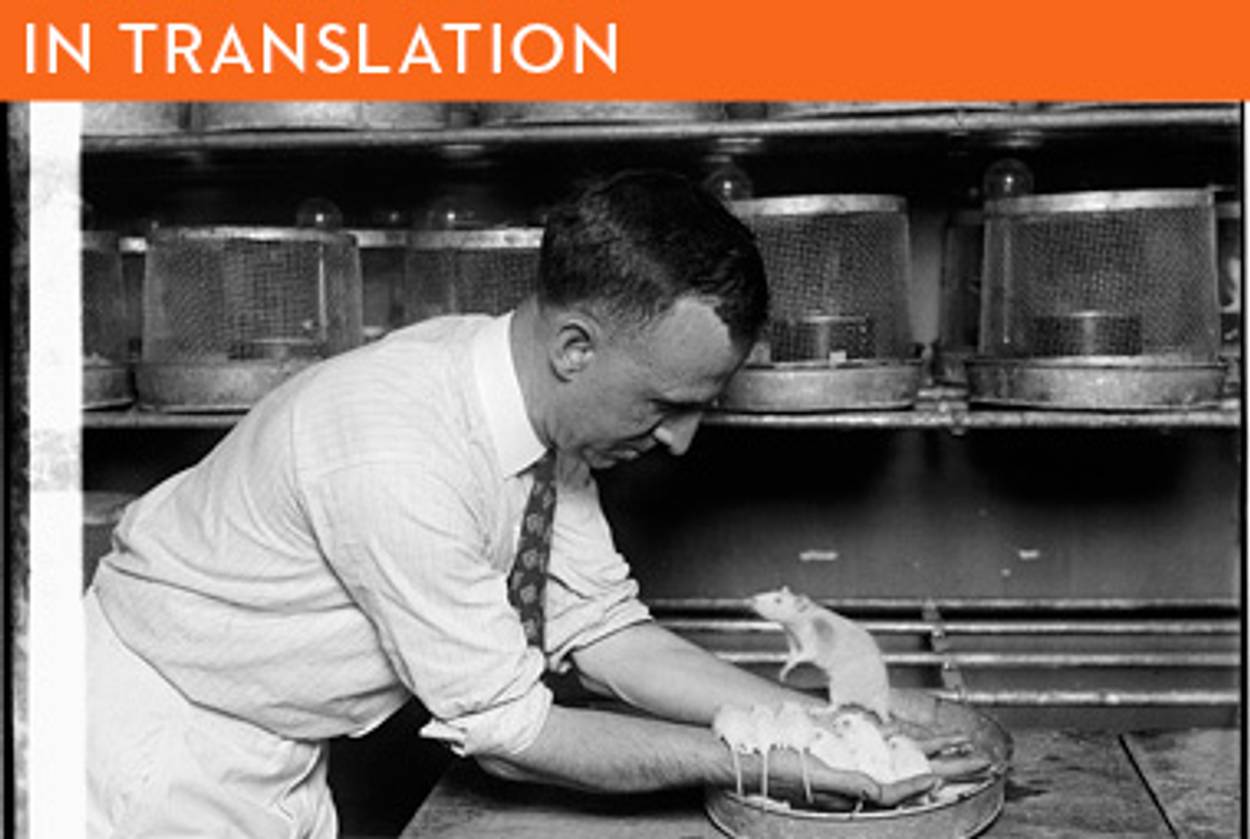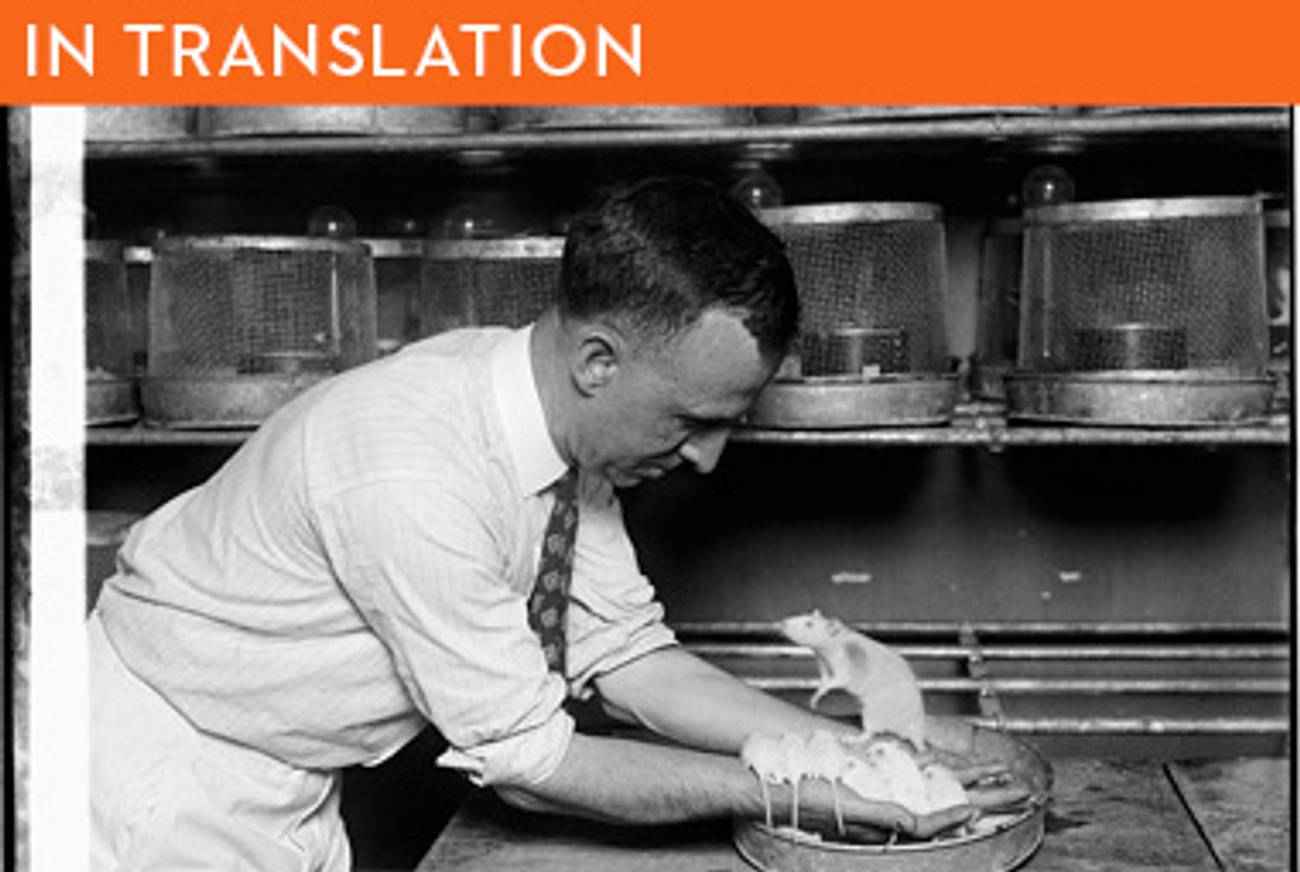Experimental Fiction
In a 1931 novel, Ernst Weiss integrated medicine and literature




Once, a Hungarian physician by the name of Ignaz Philipp Semmelweiss (1818-1865) took it upon to himself to investigate the causes of childbed fever in the maternity ward of Vienna’s largest hospital. There, in the cramped, squalid quarters where the poor gave birth—the rich birthed at home, delivered by professional midwives—mortality rates for mothers were as high as 35 percent. Semmelweiss theorized that patients were being killed by medical students, who came to deliver babies directly from the operating room or dissecting table; from performing surgeries or autopsies on patients with terrible diseases. He proved this by having students wash their hands in chlorinated bleach before entering the obstetrical clinic. The number of fatalities dropped, but the simplicity of this solution so annoyed the doctor’s colleagues that Semmelweiss was stripped of his credentials, and the mortality rate soared once again.
I’ve often imagined how this little morality tale would have been turned into a story by various writer-physicians. Dr. Anton Chekhov would have written a subtle but sorrowful account of logical injustice, administering to his pained women the anodyne of peasant humor. Dr. Louis-Ferdinand Céline would have written it louder and angrier, its ironies punctuated with insistent exclamation marks. As it is, in 1924 Céline, then known by his birthname, Destouches, produced a thesis titled The Life and Work of Ignaz Philipp Semmelweiss (practicing in Paris’s impoverished Montmartre, Céline’s specialty was also obstetrics). In the early days of its modernity, medicine was as much science as art, and Céline’s doctoral thesis was as significant medically as it was literarily: it asserted that what we call objective tragedy is just an instance of subjective ignorance, a refusal to recognize our failings.
Situated somewhere between the two, between Chekhovian understatement and Céline’s shocked histrionics, we would find the treatment by Ernst Weiss, a doctor and writer from Austro-Hungary. His Georg Letham: Physician and Murderer, has just been published in English nearly 80 years after its German debut and, in terms of character and plot, it can be read as an extreme transference of the Semmelweissian figure: Weiss’s hero, the eponymous Letham, is such a competent, dedicated scientist that he is imprisoned—though, unlike Semmelweiss, as the author’s subtitle tells us, Letham’s zeal for free research has led him to murder.
***
Ernst Weiss—like not only Chekhov and Céline but also like Arthur Schnitzler, William Carlos Williams and, if we must, Michael Crichton—was a physician and creative writer, and he, more than any of his peers, found a way to integrate the disciplines. The best of his books concern medicine and medical workers: doctors, nurses, patients, doctors and nurses becoming patients, and test subjects both witting and not. Weiss was born in 1882 outside Brünn, Austro-Hungary, now Brno, Czech Republic, and grew up in towns throughout Moravia and, later, in Prague and Vienna, where he obtained his medical degree in 1908. After practicing in Berne, Berlin, and Vienna (in the last under Dr. Julius Schnitzler, Arthur’s brother), he contracted tuberculosis, and went to recover on voyages aboard the liner Austria to India and Japan. In the correspondence of Joseph Roth, a fellow chronicler of European infirmity, Weiss is described as “a man who traveled to the coasts of foreign lands as a ship’s doctor without setting foot on land, and who stayed in his cabin in order to write.”
Upon his return to Prague in 1913, Weiss made an impression on another Empire luminary, Franz Kafka. Here is a selection of Kafka’s diary entries about Weiss:
“Jewish physician, typical Western European Jew, to whom one therefore feels instantly close.” (7/1/1913)
“Artificial constructions in Weiss’ novel. The strength to abolish them, the duty to do so. I almost deny experience.” (12/8/1913)
Here Kafka is referring to Weiss’ first novel, Die Galeere, or The Galley, which concerns a radiologist and is among the first texts, literary or scientific, to link x-ray radiation with cancer. After a wartime career as a military physician, for which he was awarded a Gold Cross for bravery, Weiss settled into practice in Prague with his wife, Rahel Sanzara (a pseudonym for Johanna Bleschke), a dancer, actress, and novelist. In 1921 they moved to Berlin, but Weiss returned to Prague alone in 1933 to tend to his dying mother. Between 1913 and the end of his life, Weiss wrote nearly 20 novels, including Der Augenzeuge, or The Eyewitness.
That book, written in 1938, published posthumously in 1963, concerns a German veteran of World War I, referred to as A.H., obviously Adolf Hitler. A.H., suffering from “hysterical blindness,” is committed to a military hospital. Hitler himself was diagnosed with just such a condition, hysterische Blindheit, at the military hospital at Pasewalk in 1918, and Weiss is said to have had access to Hitler’s medical file, which was smuggled to Paris for safekeeping by Hitler’s wartime psychiatrist, Dr. Edmund Forster. (It is, of course, indecently funny to imagine Hitler submitting himself to Freud’s discipline, that derided “Jewish science.”) It was in Paris that Weiss lived after the death of his mother in 1934. On June 14, 1940, the Nazis invaded, and the writer either ingested poison or overdosed on barbiturates. But, curiously for a physician, the amount he took of either substance was not sufficient, nor was the subsequent slashing of his wrists immediately effective; his suicide was successful only 24 hours later.
***
George Letham, Physician and Murderer is only the fourth book of Weiss’ to be published in English (The Eyewitness, The Aristocrat, and Franziska preceded it), but it is the longest and most characteristic. Its 500 pages tell the story of a man who, in order to end his unhappy marriage and so to immerse himself in research, injects his older, wealthier, well-insured wife with a lethal poison known as Agent Y, then proceeds to botch a cover-up: The man leaves the syringe at the crime scene, and he immediately rushes off to confess to his father, a powerful official in municipal bureaucracy. (It sometimes seems as if all fathers in Austro-Hungarian fiction are “powerful officials in municipal bureaucracies.”) Letham, after being underserved by an inept lawyer, is sentenced to a tropical penal colony ravaged by Yellow Fever, known in the book as Y.F. (Joel Rotenberg’s translation is occasionally disappointingly faithful.) There, as prisoner, he finds the professional purpose that was unavailable to him in civilian life, as he begins to search for the origins of the epidemic. Formerly an isolated technician, in the colony he’s forced to interact with patients, especially with a young beautiful Portuguese girl—in addition to convicted murderers, rapists, thieves and, what’s worse, benign homosexuals such as his cellmate, March. (Georg Letham is notable among period novels for being entirely uneuphemistic in its treatment of homosexuality.)
Gradually, a mosquito—either Stegomyia calopus, or Stegomyia fasciata—is identified as the carrier of Y.F., and by novel’s end that insect is eradicated while the narrator, the wife-murdering Letham, insists on not being credited for his service to humanity. Indeed, as soon as Y.F. is neutralized, the book concludes, and Letham disappears, along with unresolved subplots about rat-catching (rats being the terrene version of mosquitoes, perhaps), expeditions to claim the North Pole, and the malevolence of paternal love.
Georg Letham is essentially an exploration of medical ethics—of what the limits of research can be. Is it ethical to perform experiments on animals? Is it ethical to perform experiments on people? Is it more ethical or less ethical to experiment on prisoners? These questions are not so much implied in the text as sincerely asked; this is a first-person-book, and Letham has no compunction about rhetorically, and even non-rhetorically, stating his concerns. Though writers today have convinced themselves of a greater sophistication than this, and tend to bury their philosophy within the flesh of their narratives, Weiss’s primitive address remains overwhelming: it doesn’t seek to fool or numb us with art; rather, it pushes us to consider and answer these questions, as opposed to just flattering us for having discovered these questions embodied in the characters and scenes of a novel.
Georg Letham itself is an experiment: it wants to investigate how fiction can, like a mosquito or rat, transmit the pathogen of fact; and how art can analgesce man’s relationship to nature. Reading Weiss, we’re reminded that the laws of nature are not the suggestions and insights of literature—natural law is infinitely more stark and remorseless—and that the truths of science cannot be refracted or bent; they can only, per Semmelweiss, be ignored. It was Weiss’ depressive achievement that he took these truths—the truths of infection, and disease—and, recognizing the peril of ignoring them, repurposed them as test cases: to demonstrate, through novels of exceptional directness, how fallibly we humans respond to the ultimate fact of our mortality.
Joshua Cohen was born in 1980 in Atlantic City. He has written novels (Book of Numbers), short fiction (Four New Messages), and nonfiction for The New York Times, Harper’s Magazine, London Review of Books, The Forward, n+1, and others. His first essay collection, Attention: Dispatches from a Land of Distraction, will be released in August. In 2017 he was named one of Granta’s Best of Young American Novelists. He lives in New York City.
Joshua Cohen was born in 1980 in Atlantic City. He has written novels (Book of Numbers), short fiction (Four New Messages), and nonfiction for The New York Times, Harper’s Magazine, London Review of Books, The Forward, n+1, and others. He is the recipient of the 2022 Pulitzer Prize in fiction, for The Netanyahus: An Account of a Minor and Ultimately Even Negligible Episode in the History of a Very Famous Family. He lives in New York City.